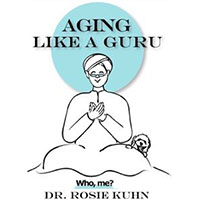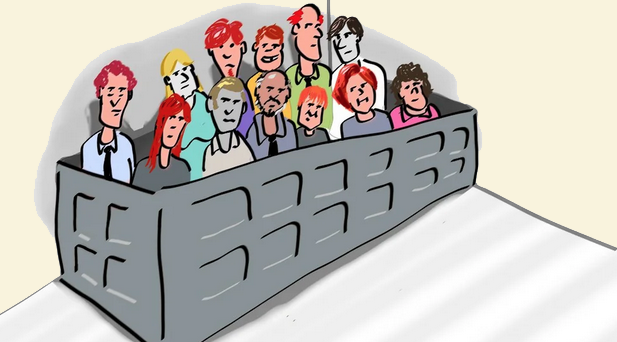— Aging Like a Guru by Rosie Kuhn —

While scrolling through posts on my Facebook page the other day, I came across a photo of some of my friends that was taken a couple of weeks ago. I hadn’t seen them for about seven years but each of them in this photo was hardly recognizable to me. Most of them are now in their 60s. Each had gained at least 20 pounds, and each appeared to have lost that vibrancy that made them unique and attractive not so long ago.
My instant response was deep sadness, as though these people were gone, died, left the planet. Now, I experience a sense of anguish inside me — a pain, a loss, a hopelessness and powerlessness, that these beautiful beings are a tiny fraction of the spark of life they used to be. They appeared to have given up their will to be joyful in life, but for what? It is as if they have given up and quit trying. The photo could be titled, “Aging Like a Quitter.”
This momentary experience of being with this photo has had a deep impact on me. First of all, I can see how I may be headed in the same direction, letting go of caring about myself and my body. Second, I question, for myself and for all of us, what is it that allows for the “decline into decrepitude” to occur? Now this is all projection, mind you, but it makes sense to me that something is happening, and I want to know what that is. Inquiring minds want to know.
Is it mandatory for us to become rolly-polly?
I saw a photo of a guy when he was 17. He was thin, strong, and loved playing guitar. Today, at the age of 71, he can hardly get out of his chair. His belly is huge, and he doesn’t seem to have much to be excited about. This fellow, and those I mentioned above, stir me up — not with judgment, but again with deep sadness. My context — the way I interpret life, says that each of us has the responsibility and capacity to care for our bodies, our hearts, our minds, and our spirits. When we get sick, it’s an indication that we are not in alignment with this principle. We are not walking our talk, maybe we aren’t even talking our talk. And, truth is, my context of well-being isn’t the same as the majority of individuals, especially in the U.S. Maybe, people just don’t care. Maybe they don’t know how to care!
Getting depressed is an option, perhaps, but not the only option
I don’t like using the term ‘depressed’; mostly because depression more often than not is a mixed-up package of grief, powerlessness, and hopelessness. It isn’t terminal, it’s rarely a mental disorder, and it is absolutely resolvable — not necessarily with medication, but with presence of mind to the presence of realness of who we are within our human existence.
Sometimes life sucks. Sometimes bad things happen. Sometimes our dreams don’t come true. Sometimes our hopes are taken away from us. And, given any one of these scenarios, we feel vulnerable enough without having to feel the despair, despondency, disillusionment of who we hoped we would be. More often than not we say: “I’m depressed, so just give me the pill that will make all of that go away.” Or, “Give me a beer.” “Give me some cake!” “Give me some sex!” “Just give me something so I don’t have to feel me!”
The process of aging for most of us emphasizes the enormity of our ignored pain. Our bodies begin to create symptoms of our depressed-oppressed-suppressed emotions. Those symptoms turn into heart-disease, liver-disease, cancers, and what-not. We go to doctors for treatments of our bodies, while we deny the cause of the symptoms in the first place — the stress of being human — and the choices made to ignore, distract, and deny “the ME and my existence” within our bodies.
It’s Simple but not easy
People who cure themselves of disease do so by focusing not only on their bodies, but also on their whole-being. They understand that it requires a commitment to being present to all of who they are. They return to their heart’s desire, being creative and playful. They become active again in the ways that delight the young child within. And, even just that shift cures what ails them. It’s very cool.
My very good friends, Carol and Martin, in their mid-70s, got themselves some e-bikes, and they each got one of those smart watches that inform them of how active they’ve been during their days. Over the past few weeks I’ve delighted in the degree to which they have enlivened their lives with riding their bikes, going for picnics, smiling. and enjoying themselves in ways that seemed well behind them. They changed their attitudes. They are more spontaneous, and they are having fun together as a couple.
That Carol and Martin shifted themselves to bring more joy into their every day lives, inspires me to be mindful of when I want to settle for complacency, when I want to give up on myself, when I want to ruminate in the powerless-hopeless truth that my life isn’t going to be extraordinary without me participating.
I’m not about to get an e-bike or a smart watch, but I’ll be changing my attitude and choosing more mindfully how I want to, and will be, living an extraordinary life. I truly believe not only that life is supposed to be fun, but that life is fun. Now, to choose to make it so is totally up to me!
For more blogs, books, videos, or if you are interested in coaching or training with Dr. Rosie, check out her website: www.theparadigmshifts.com. And her podcast can be found at aginglikeaguru.podbean.com. The book Aging Like a Guru – Who Me? and Dr. Rosie’s other books are available at Darvill’s Bookstore, the Cottage Gift Shop, and Amazon.
**If you are reading theOrcasonian for free, thank your fellow islanders. If you would like to support theOrcasonian CLICK HERE to set your modestly-priced, voluntary subscription. Otherwise, no worries; we’re happy to share with you.**







